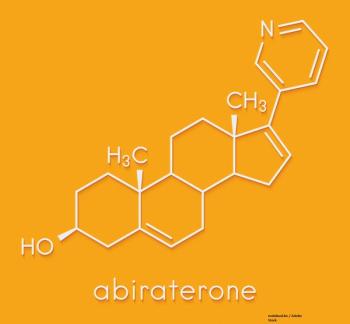
This study compared combination therapy with enzalutamide, abiraterone, and prednisone vs enzalutamide alone in men with metastatic castration-resistant prostate cancer.

Your AI-Trained Oncology Knowledge Connection!


This study compared combination therapy with enzalutamide, abiraterone, and prednisone vs enzalutamide alone in men with metastatic castration-resistant prostate cancer.

This study tested first-line treatment with cabazitaxel vs hormonal therapy in patients with metastatic castration-resistant prostate cancer with poor prognosis.

In this video, Dr. Heather Cheng briefly outlines the GENTleMEN study on the impact of genetic testing for men with advanced prostate cancer.

In RCC patients on anti–PD-1 therapy, besides the indel count link to better OS, baseline tumor infiltration with M2 macrophages predicted improved PFS.

A multicenter, international phase II study found higher-dose and extended-dose therapy with Ra-223 did not improve survival or pain scores.

In SPCG-13, adjuvant docetaxel without prednisone did not impact biochemical DFS in intermediate- or high-risk disease treated with radical RT with ADT.

OS with the PSA-targeted, poxvirus-based cancer vaccine was no better than placebo, and increased survival was attributed to better standard of care.

USPSTF Vice-Chair Alex Krist and prostate cancer specialist David Penson shared perspectives on USPSTF’s updated prostate cancer screening recommendation.

In the PROPHECY study, men with mCRPC and AR-V7–positive CTCs had only a 0% to 11% probability of benefit from abiraterone or enzalutamide.

Making some changes to the gut microbiome may improve outcomes with immune checkpoint inhibitors in renal cell carcinoma.

In the Italian RESORT trial, sorafenib did not affect recurrence-free survival in patients with mRCC following radical resection of metastases.

Pembrolizumab monotherapy showed promising antitumor activity in clear cell RCC in the phase II KEYNOTE-427 trial.

Patients treated for RCC with atezolizumab plus bevacizumab reported fewer impacts to daily function and quality of life than those on sunitinib.

For many patients diagnosed with metastatic renal cell carcinoma, sunitinib alone is not inferior to surgery followed by sunitinib.

In AFT-30, increased frequency of PSA screening for localized prostate cancer did not boost survival, regardless of primary treatment or disease risk.

Preliminary findings for pegilodecakin plus immune checkpoint inhibition suggest that the combination is tolerable and shows clinical activity.

In the Abi Race study, response to abiraterone was greater and longer lasting in black men with prostate cancer, compared with white men.

A pooled analysis including data from over 8,000 men showed survival outcomes were better for black men, after adjusting for prognostic variables.

No one molecular biomarker is likely to guide treatment of RCC in the foreseeable future. Multipredictor models might be a way forward, an expert concluded.

Germline genetic testing guidelines and Gleason scores do not predict which patients with prostate cancer will test positive for pathogenic gene variants.

Analysis from a phase III trial confirmed the prognostic value of a 16-gene recurrence score in patients with high-risk renal cell carcinoma undergoing adjuvant sunitinib therapy.

Pazopanib 600 mg daily as adjuvant therapy did not prolong disease-free survival for patients with locally advanced renal cell carcinoma.

This video reviews second-line data from the IMmotion150 trial, which initially studied atezolizumab with or without bevacizumab vs sunitinib in untreated metastatic renal cell carcinoma patients.

Androgen deprivation therapy can be safely reduced from 36 months to 18 months in high-risk prostate cancer, according to results of a phase III trial.

Continued enzalutamide with abiraterone failed to improve PFS in men with metastatic castration-resistant prostate cancer who progressed on enzalutamide alone.

Tumor expression of the oncogene ERG might predict patient benefit from adding docetaxel to androgen deprivation therapy, according to analyses of two phase III clinical trials.

A molecular signature for aggressive-variant prostate carcinoma can predict which men with castration-resistant prostate cancer will benefit from cabazitaxel with or without carboplatin.

Liver toxicity precludes development of pembrolizumab plus pazopanib immunotherapy for patients with advanced renal cell carcinoma.

Plasma levels of HGF, BAP1 and PBRM1 gene mutation status, and angiogenesis gene expression are promising predictive biomarkers for survival in RCC patients.

Despite high rates of toxicity, a first-line tyrosine kinase inhibitor/immunotherapy combination exhibits promising antitumor activity in metastatic renal cell carcinoma.